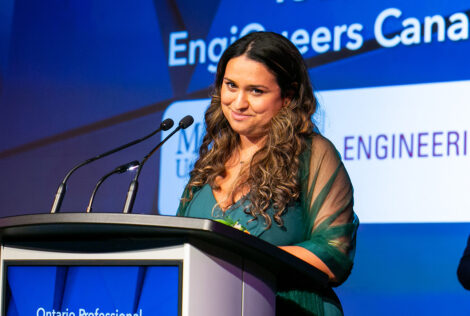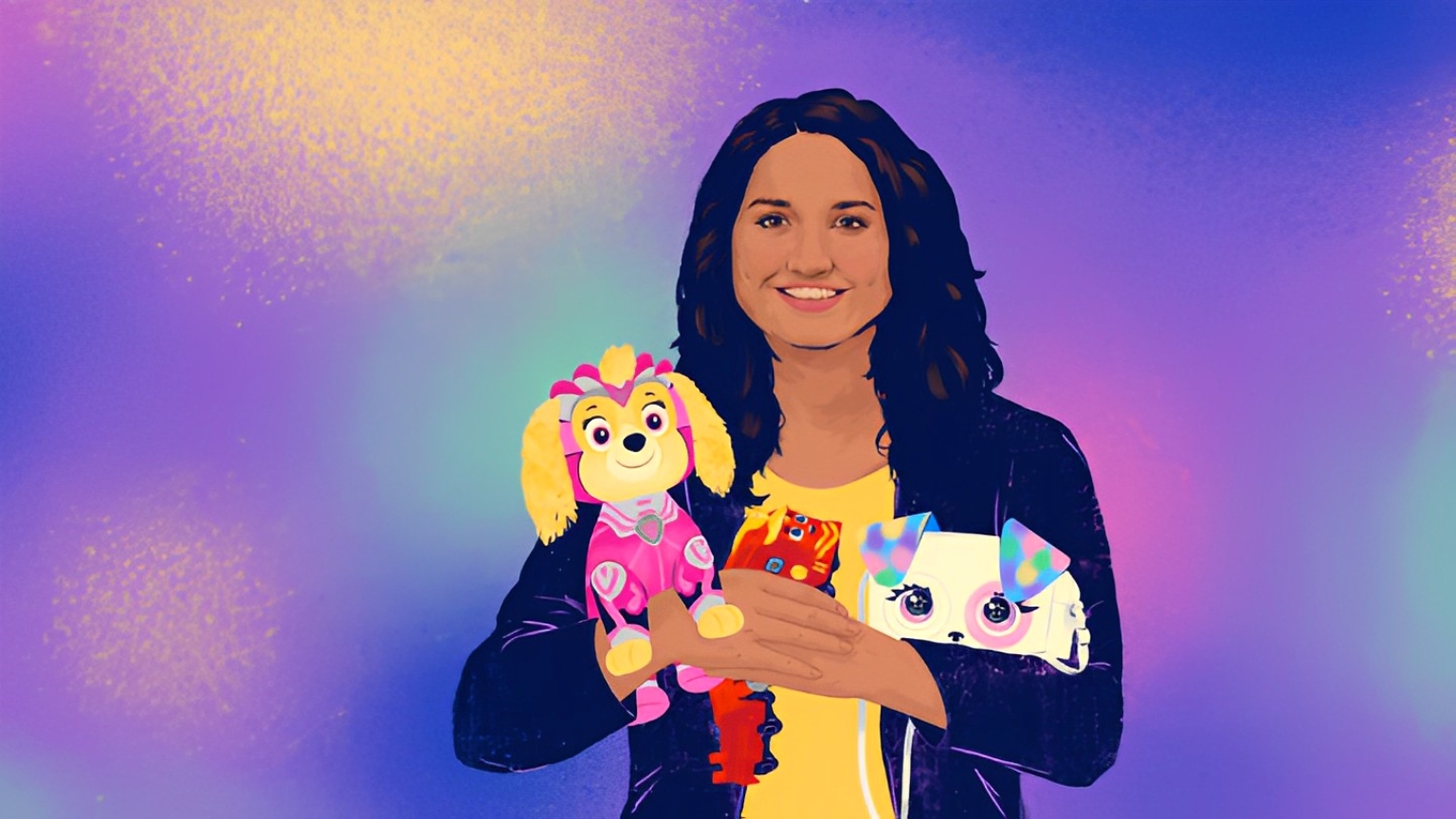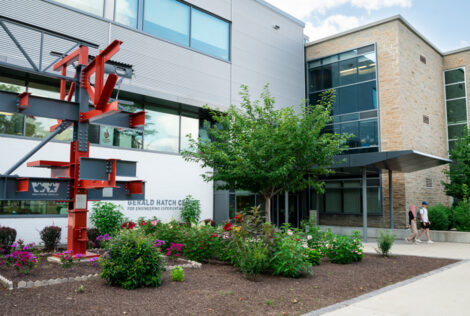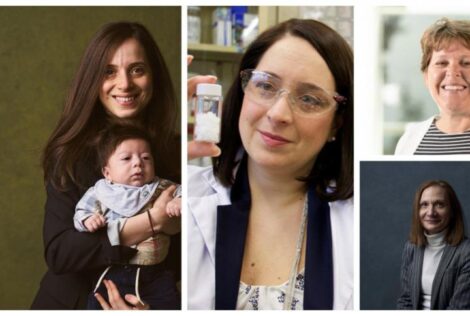

At the risk of bubble-bursting, toys don’t come from a magic workshop.
Every toy lining the shelves of stores was designed by a skilled team, working together to create innovative, safe and fun designs. McMaster University Materials Engineering and Management (’18) graduate Vanessa Raquel Raponi heads up one such team as the Manager, Manufacturing Engineering with Canadian-founded toy giant Spin Master.
Raponi oversees all Europe, Mexico and US manufacturing as her team brings to life products based on globally recognized brands that delight millions of people. It’s not a job without challenges, but as an engineer, she’s ready to find the right solutions while working to improve the industry for everyone.
Sparking a love for engineering
While Raponi grew up fascinated by STEM careers, she did not always have her eyes set on becoming an engineer herself. “When I first started, I really had very limited knowledge and understanding of engineering,” she says of her time as a first-year McMaster student. “But as I went through the courses, and specifically went through the co-ops, I really saw what engineers did in the real world and how materials engineering could be applied in lots of different ways. And I truly just fell in love with manufacturing.”
While in-class learning plays an important part in an engineering education, Raponi is quick to encourage current students to expand their avenues for learning beyond the limits of the classroom.
What’s unique about McMaster is all of the bonus add-ons that come with the degree, and it’s really up to the individual student to seek those out. That’s where I really developed a lot of my professional development, communication and leadership skills that have been able to position me to be a manager at this stage in my career.
For Raponi, these additional opportunities totaled more than 28 months of co-op experiences including internships at PepsiCo and Bombardier. “I got to physically be in manufacturing facilities,” she remembers. “That kind of exposure really made me realize the main interest I had was manufacturing engineering.” Seeing engineers work on everything from airplanes to cereal made it clear what a diversity of experience the materials engineering field can offer.
Attaining unexpected skills in the engineering curriculum
Raponi was surprised by the development of what’s traditionally regarded as ‘soft’ skills in addition to the theory and functional skills core to engineering. “Both problem solving and teamwork were very critical to my experience as an engineering student,” she says.
What topped her list of valuable skills was learning how to learn. She explains, “Regardless of what field you’re majoring in, by the time you’re in the actual workforce, it’s going to get significantly more specialized to the industry and the requirements of your individual job and role. There will be much more learning to do.”
Given the variety of roles and industries that engineers can enter upon graduating, a growth mindset has proven vital for Raponi.
A day in the manufacturing life
Spin Master is a large company with multiple recognized brands including Hatchimals, Kinetic Sand and PAW Patrol, all with different manufacturing needs and processes that must be coordinated, reviewed and optimized. In Raponi’s role as a manager, she constantly relies on her abilities to learn and adapt. “Every single day of the last five and a half years of my job has looked different from every other day. You literally never know what might come up,” she says with a laugh. “I rotate my focus between a variety of interdisciplinary teams across the business.”
Whether it’s checking in on the latest prototypes, validating designs with manufacturing vendors, having the right stakeholders sign off or calling an all-hands meeting to figure out a technical product challenge, Raponi needs to be ready to find creative solutions and push the team forward at all times.
We manage the process really closely and are able to prioritize making toys that kids love and are going to be lots of fun and create really exciting magic moments for them.
Manufacturing a sustainable future
Sustainability is paramount to Raponi. As leader of the Product Sustainability Committee at Spin Master since its inception, she has played an active role in implementing sustainable practices. “Our company was really passionate about making sure we were doing the right thing and avoiding greenwashing,” she says. “My role has really been about the product itself and finding alternatives to single-use plastic.”
This work has led to the integration of recycled resin into the manufacturing process, which has allowed them to offset hundreds of thousands of pounds of plastic. This commitment to sustainability includes reducing the amount of plastic used in the packaging of the toys by 50% by 2025.
“We’re making really meaningful progress towards that goal,” she says proudly.
Building a better industry
Raponi’s passion for engineering extends beyond the job itself and manifests as a desire to help create an industry that is welcoming and supportive of everyone. While at McMaster, she founded EngiQueers Canada, a non-profit organization advocating for diversity and inclusivity in engineering. The organization has grown to encompass more than 30 student groups across the country and hosts a national annual conference dedicated to further fostering connections between queer students in STEM.
For her work with EngiQueers Canada, Raponi recently received the Achievement of the Year award from the Ontario Society of Professional Engineers (OSPE). She remains strongly committed to supporting people with a passion for engineering who are worried they might not fit into the standard mold.
“Sometimes the engineering industry can seem a little homogenous,” Raponi acknowledges. “But I’m a queer woman of colour and have been able to find my path and way throughout the engineering space and leverage the skills that I learned. For any folks who are feeling like they might not see themselves in engineering right now or are disheartened through whatever process they’re in right now, just know that there are success stories out there and that the industry is changing and moving in the right direction. They can find a place for themselves in engineering.”
If you would like to become involved with EngiQueers Canada, you can visit their website to learn more.


